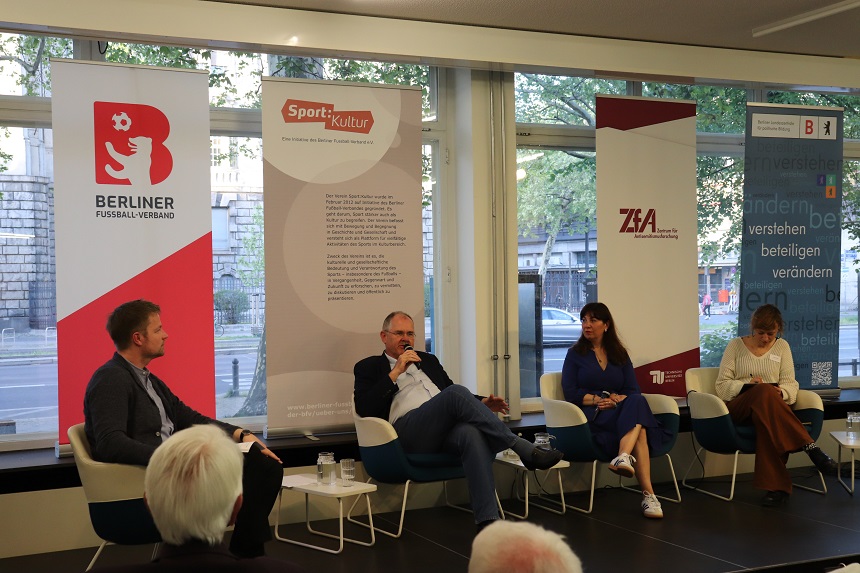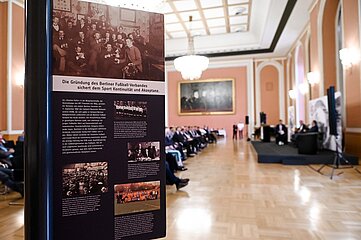On April 28 and 29, 2025, the Berlin Football Association hosted a symposium at the Berlin State Center for Political Education to present the results of its study commissioned in 2022 on the history of Berlin soccer during the Nazi era to the public for the first time. Key research findings were presented and put up for discussion in four thematic panels. The Center for Research on Anti-Semitism at TU Berlin collaborated on the study together with other experts from various disciplines.
An evening of dialog
The event began on Monday evening with words of welcome from BFV President Bernd Schulz and TU President Geraldine Rauch. In their speeches, both emphasized the importance of cooperation between the association and the university. This was followed by introductory words from project managers Thomas Schneider and Daniel Küchenmeister from the Sport:Kultur e.V. association, who invited everyone involved to join in the discussion. As a result, the day not only marked a milestone in terms of content, but also in terms of methodology: The academic debate has already been opened up for criticism and participation before the publication is released in November 2025 for the BFV Association Day.
The content kicked off with a lecture by Prof. Dr. Dr. Franz-Josef Brüggemeier, who gave a historical perspective on soccer and its influence in the late Weimar Republic and the Nazi state. Afterwards, representatives from sport, academia and civil society - including Bernd Schultz (BFV), Uffa Jensen (ZfA), Keren Vogler (Maccabi Germany) and Daniela Wurbs (KickIn!) - moderated by Ronny Blaschke. They discussed the German culture of remembrance, the responsibility and role of sport and soccer as a place of encounter. The evening ended with finger food and discussions in a relaxed atmosphere.
Four panels, many perspectives
The second day of the conference began with a welcome address by Özgür Özvatan, BFV Vice President for Social Responsibility, who impressively emphasized the responsibility of soccer and the association, while also sharing personal memories and first experiences in soccer.
Thomas Schneider and Daniel Küchenmeister then gave an insight into the concept and design of the study: they explained the multi-perspective and collaborative approach. Consequently, the years before 1933 and after 1945 were also to be examined in order to make continuities visible. Küchenmeister emphasized that although there had already been individual studies on the topic of the Nazi era in sport, for example in basketball or on specific clubs, it was a first for a regional association such as the BFV to officially commission a comprehensive study.
The subsequent panels provided space for in-depth discussions:
Panel 1: The Berlin Football Association and its players
Panel 2: Football clubs during the Nazi era
Panel 3: The exclusion of Jewish athletes and their clubs
Panel 4: Life paths during the Nazi era
After the lunch break, the project managers presented initial recommendations for action for the BFV. It can be concluded that the association must continue to see itself as a social actor that derives responsibility for the present and future from the past.
Taking responsibility
In her keynote speech, Prof. Dr. Stefanie Schüler-Springorum (Director of the ZfA) emphasized the importance of stable alliances between science, sport and educational institutions. She was also enthusiastic about a proposal that had previously been made in the recommendations for action: stronger cooperation with Berlin district museums in order to strengthen the local culture of remembrance. Together with Özgür Özvatan, she discussed comments from the audience, such as the desire to include the perspective of East Germany.
In her closing remarks, Özgür Özvatan warned that the association could not limit itself to combating racism alone - rather, an intersectional perspective had to be adopted. It is important to listen to those affected and to actively take responsibility. The history of soccer during the Nazi era is not only a thing of the past, but also a touchstone for the present.
The work on the BFV study on the "History of Berlin Football in the Nazi Era" was funded by a grant from the Stiftung Deutsche Klassenlotterie Berlin (DKLB).







